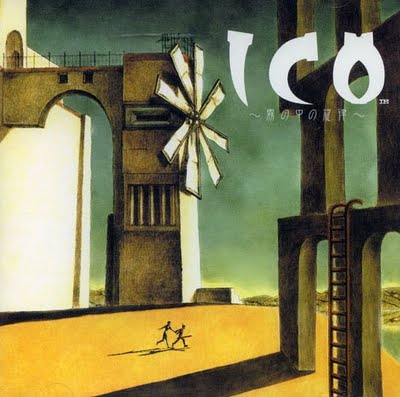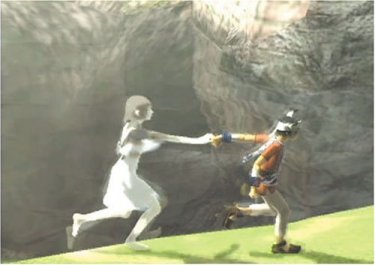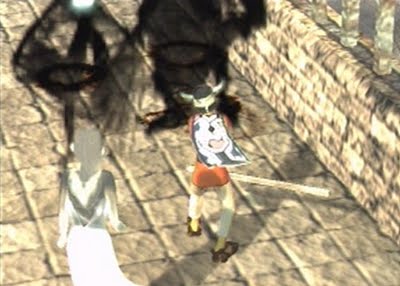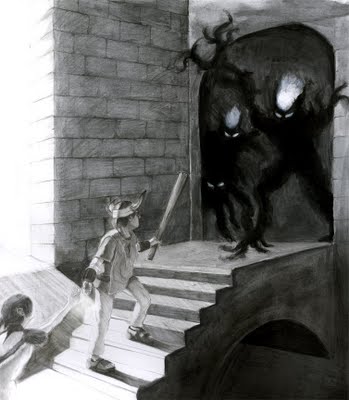This post has not been edited by the GamesBeat staff. Opinions by GamesBeat community writers do not necessarily reflect those of the staff.
Warning! Spoilers – Consider yourself warned
Warning! Pretentious – The following piece of writing was found way up my own arse.
I co, by Team Ico, and released on the Playstation 2 in 2001, is a remarkable game for many reasons. You could cite the stunning visuals or the fluid, lifelike animation as proof of this, or perhaps you could point to the haunting beauty the whole game possess.
co, by Team Ico, and released on the Playstation 2 in 2001, is a remarkable game for many reasons. You could cite the stunning visuals or the fluid, lifelike animation as proof of this, or perhaps you could point to the haunting beauty the whole game possess.
But it’s not just through these means that the game is a masterpiece; it also manages to convey subtle metaphors to give it a much deeper level of meaning.
For me the game not only tells the story of Ico’s quest to rescue Yorda, but also their loss of innocence throughout the game, culminating in their ascent into adulthood.
We can see quite clearly that Ico and Yorda are clear representations of youth. Ico himself is unsure on his feet, like a teenager going through puberty, and Yorda  is likewise at that awkward stage in adolescence where she seems far too tall for herself.
is likewise at that awkward stage in adolescence where she seems far too tall for herself.
Their relationship seems to add to this image, the eagerness with which he pulls her along combined with her relative apathy is a dynamic anyone can see out in public, with small children energetically leading around older siblings and parents who seem more reluctant.
Yorda’s entire image suggests innocence. Her pale skin is narratively probably a result of her imprisonment, but this combined with her white dress creates a picture so often associated with the purity and innocence of a young girl. Ico’s character is likewise, escaping his initial prison he immediately sets about trying to escape from the castle, fearless and naive.
The game’s enemies contrast wholly with Yorda in particular. They are nameless, colourless and formless, which gives the feeling that they’re supposed to represent an idea or a notion rather than the physical threat they actually pose. The fact that they will only ever try and take Yorda, despite Ico being the more obvious threat, seems to suggest they represent adulthood, the threat of growing up.
 As discussed earlier Yorda seems much older than Ico, therefore it would follow that she is closer to adulthood, and thus it could be that the demons trying to take her away is a sign of her impending transition.
As discussed earlier Yorda seems much older than Ico, therefore it would follow that she is closer to adulthood, and thus it could be that the demons trying to take her away is a sign of her impending transition.
If the demons are to represent maturity then the Queen is clearly the epitamy of this. Her aim throughout the game is to use Yorda’s body to further her own life, but by introducing her adult mind into Yorda’s pre-pubescant body she would destroy Yorda’s innocence completely. Everything a woman slowly learns throughout her life would be introduced into Yorda’s mind in an instant.
 Perhaps as in real life, ageing is inevitable though. On escaping the castle we see Yorda’s hair has turned much darker, which could signify a loss of innocence. Perhaps the act of fighting maturity in itself actually caused the pair to grow up and escape into the real world, where, like adulthood, far greater perils exist.
Perhaps as in real life, ageing is inevitable though. On escaping the castle we see Yorda’s hair has turned much darker, which could signify a loss of innocence. Perhaps the act of fighting maturity in itself actually caused the pair to grow up and escape into the real world, where, like adulthood, far greater perils exist.
Ico is a fantastic game even without all this imagery, but with it it’s a masterpiece. If you haven’t played it yet I strongly urge you to, and if you have then I urge you to read further into it. There’s still much more in there to analyse, for example I can’t for the life of me work out the meaning of Ico’s horns beyond the narrative purpose it serves of getting him imprisoned in the first place.
What are the Mob’s thoughts on this?
